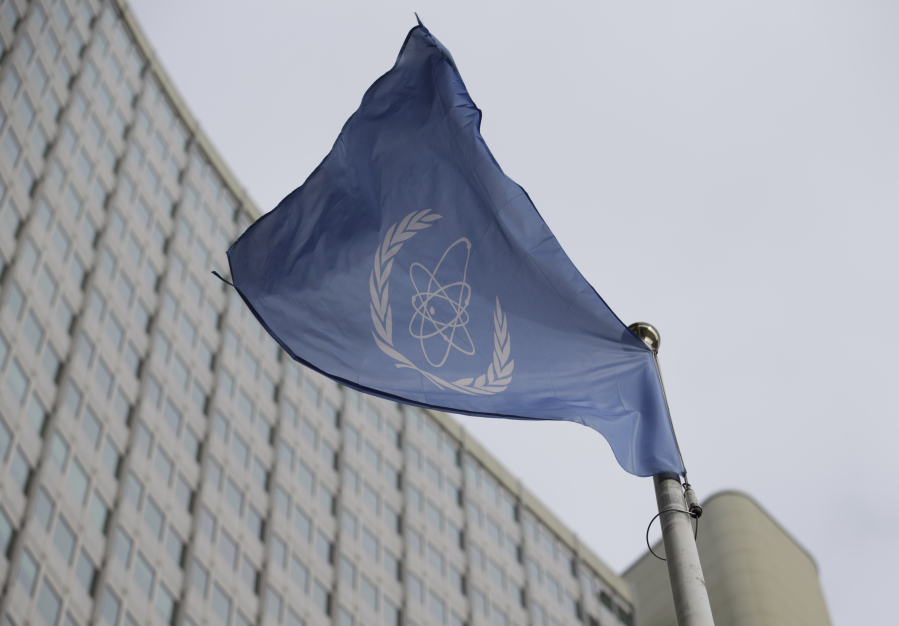VIENNA — Iran has slowed the pace at which it is enriching uranium to nearly weapons-grade levels, according to a report by the United Nations’ nuclear watchdog seen by The Associated Press on Monday. That could be a sign Tehran is trying to ease tensions after years of strain between it and the U.S.
The confidential report comes as Iran and the United States are negotiating a prisoner swap and the release of billions of dollars in Iranian assets frozen in South Korea. However, international inspectors also noted new challenges in trying to monitor Iran’s program.
In an effort to ensure Iran could not develop atomic weapons, world powers struck a deal with Tehran in 2015 under which it agreed to limit enrichment of uranium to levels necessary for nuclear power in exchange for the lifting of economic sanctions. U.N. inspectors were tasked with monitoring the program.
Then-President Donald Trump unilaterally pulled the U.S. out of the accord in 2018, saying he would negotiate a stronger deal, but that didn’t happen. Iran began breaking the terms a year later.
The International Atomic Energy Agency said in its report that Iran has 121.6 kilograms (268 pounds) of uranium enriched up to 60%. That means its stockpile of the fuel is growing at its slowest pace since 2021. A report in May put the stockpile at just over 114 kilograms (250 pounds). It had 87.5 kilograms (192 pounds) in February.
Uranium enriched at 60% purity is just a short, technical step away from weapons-grade levels of 90%.
Iran has long denied ever seeking nuclear weapons and continues to insist that its program is entirely for peaceful purposes, though the IAEA’s director-general has warned Tehran has enough enriched uranium for “several” nuclear bombs if it chose to build them.
Iran’s mission to the United Nations in New York did not immediately respond to a request for comment Monday.
Tehran likely would still need months to build a weapon. U.S. intelligence agencies said in March that Iran “is not currently undertaking the key nuclear weapons-development activities that would be necessary to produce a testable nuclear device.” The IAEA, the West and other countries say Iran had a secret military nuclear program it abandoned in 2003.
Overall, the IAEA report estimated Iran’s total enriched uranium stockpile at 3,795.5 kilograms (8,367 pounds). That’s a drop from the last IAEA report, which put the stockpile at 4,744.5 kilograms (10,459 pounds). The stockpile reportedly declined because Iran diluted some of its enriched uranium.
U.S. President Joe Biden has said he’d be willing to re-enter a nuclear deal with Iran, but formal talks to try to find a roadmap to restart the deal collapsed in August 2022. In the time since, Oman and Qatar have mediated indirect talks between Iran and the U.S. that led to the current planned prisoner swap and asset release.
Under that proposal, anywhere from $6 billion to $7 billion, depending on exchange rates, would be changed from South Korean won into euros. The cash represents money South Korea owed Iran — but had not yet paid — for oil purchased before the Trump administration imposed sanctions on such transactions in 2019.
The U.S. maintains that, once in Qatar, the money will be held in restricted accounts and Iran will only be able to use it for humanitarian goods, such as medicine and food. Those transactions are currently allowed under American sanctions targeting the Islamic Republic over its nuclear program.
In exchange, Iran would release five Iranian-American prisoners now under house arrest. The U.S. likely will release Iranian prisoners as well, though those details remain murky. If that deal goes through, it could improve the chances of overall talks on the nuclear deal resuming — though Biden already faces strident criticism from Republicans and others over the prisoner swap.
While Iran has slowed enrichment, the IAEA reported other problems with trying to monitor its program. The report from the watchdog seen by the AP said Iran had denied visas for agency officials and affected their ability to work in other ways as well.
Iran has not acknowledged the visa denials.
The IAEA also hasn’t been able to access surveillance camera footage since February 2021 under Iranian restrictions, while the only recorded data since June 2022 has been from cameras at a workshop in the Iranian city of Isfahan.
The watchdog also said that no progress has been made on its request that Iran explain the origin and current location of manmade uranium particles found at two locations that Tehran has failed to declare as potential nuclear sites.



